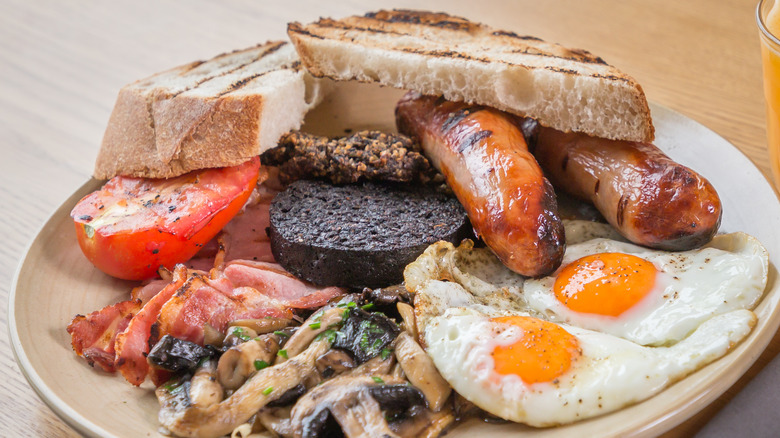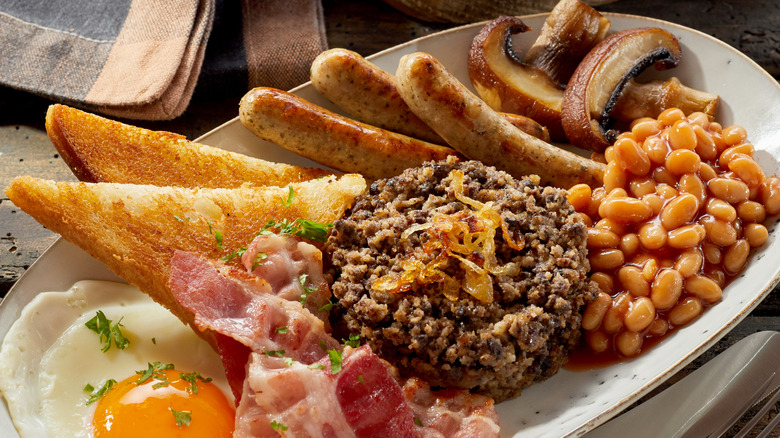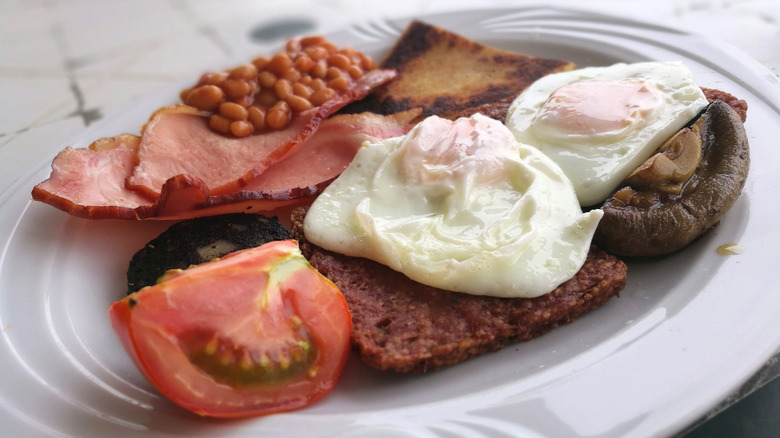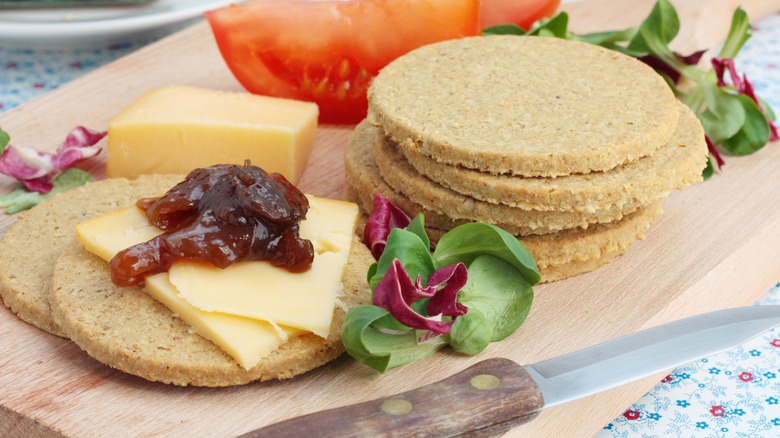What's Served In A Traditional Full Scottish Breakfast?
In Scotland, breakfast-making is a literal competition that involves a wooden spoon called the spurtle, so when Scots rave about breakfast, you know they mean business. From sausage rolls to out-of-this-world dishes, the Scots serve up hospitality, hangover cures, and meals that will embody every meaning of the word full (via Edinburgh Live). Sure, you might be able to find delicate pancakes and fluffy pastries on Scottish tables, but prepare yourself for more substantial plates of hot food, per My Scottish Heart.
A hangover cure since the mid-19th century and an excuse for Victorians to showcase their wealth, the full Scottish breakfast is quite the gastronomic affair — even though some Scots have expressed disdain for the unhealthy fry-up (via Herald Scotland). City Explorer Tours reasons the Scots need extra energy and warmth to tolerate cold weather, so sausages and fried potatoes (and much, much more) offer the calories needed to face bone-chilling temperatures.
The inclusion of black pudding
Scottish feasts have historically catered to the wealthy with dishes of meats and seasonal vegetables. Vikings introduced smoked food to the culinary landscape, and medieval Scots stirred up soupy oatmeal and thick meat stews to place on tables (via Delishably). What is actually served as part of the full Scottish breakfast can vary, but Eagle Brae asserts you can count on sausages, fried eggs, bacon, tattie scones, fried tomatoes, beans and toast, and Lorne sausage placed before you. While this may remind you of a full English breakfast, the Scots have put their own spin on the dish — starting with black pudding.
Black pudding may sound sweet, but it is blood sausage made from pork or beef fat that has been mixed with oatmeal, fried, and sliced (via City Explorers Tours). Scots polled by the Herald Scotland describe black pudding as unappealing, even going so far as to associate this kind of breakfast spread with "men in vests hanging around in transport cafes." You may also find Scotland's national dish haggis served at breakfast time, according to Eat Walk Glasgow, and notice pieces of square sausage sitting on your plate.
Heavy on the meat
The Scottish Butcher eloquently explains square sausage is exactly how it sounds — meat that has been shaped into a square. While regular sausage links are part of the Scottish breakfast, these minced pieces of fried meat squares are also added to the equation. According to About Aberdeen, this sausage variety was created by a Scottish comedian named Tommy Lorne who would eat a sausage sandwich between gigs and found the shape to be perfect for sandwiching between sliced bread.
The Lorne sausage is a mix of minced beef and pork, breadcrumbs, and seasoning. Chefs will add their own spices like nutmeg and coriander to the recipe (via Scottish Scran). To offset all this grease and fat, the circular shape of fried mashed potatoes and flour — tattie scones — may accompany the meat, per Jamie Oliver. If your breakfast doesn't have these savory potatoes, don't worry, you'll probably be served fried potatoes instead.
Variations and substitutions
If you're a vegetarian or think the Scottish breakfast sounds a little meat-heavy for your liking, Tinned Tomatoes assures you there are plenty of meat-free substitutions and vegetarian options for breakfast orders. Your breakfast can be customized with veggie sausages, veggie haggis, and vegetables like mushrooms, tomatoes, and spinach. There are also tattie scones, which are warm pieces of freshly baked bread.
For a lighter breakfast option, oatcakes can also be served as part of morning spreads. The West Hill House B&B explains that oatcakes date back to the times of the Romans, and the crispy snack has become as common as Scottish whiskey. Oatcakes are basically round pieces of oatmeal baked into cracker-like shapes and served with butter, jam, or cheese. And it's not only for breakfast, recalls London Unattached, but oatcakes can also appear alongside afternoon tea. It's clear that any visitor to Scotland, regardless of dietary preference, won't easily go hungry.



